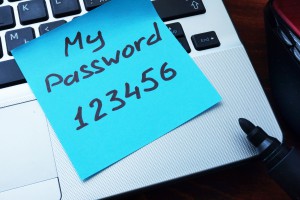It’s undeniable that the progression of computers has created unlimited possibilities for all types of businesses. The computer network allows for easy communication, a shared work environment between employees, and protected data storage. With these unlimited possibilities also come unlimited risk.
If you ignore the standard rules of IT security, those risk factors could be dangerous for you or your business. Learning to recognize the things that threaten the security of you and your business information is crucial for establishing long-term success online. Read these 5 common security mistakes that may be endangering your business.
1. You think hackers don’t want your information.
Very wrong. One of the most common mistakes made by business (especially small) owners is having a false sense of security. In fact, being a small business owner actually makes you a bigger target for hackers.
There’s an entire black market requesting the smallest details of businesses and its employees like names, addresses and phone numbers. The average cost of a stolen identity on the market starts at about $16, and although that may sound cheap, your entire database can be compromised due to your false sense of security. Hackers will also get access to important bank information you may have stored personally or for your business. Your small business provides a lot of value as a target for hackers.
2. You use “password” for all of your passwords.
Creating passwords you can easily remember may seem like a great idea, but using something very simple such as “password” or “password1” sets you up for an inevitable security breach. The art of creating strong passwords is a very strategic process. The most effective kind of password to use is a long and random one, even if it seems impossible to remember. There are many password managers you can use to create safe passwords for your business.
Luckily, our team of experts actually has 8 guidelines for making passwords for you.
3. Your employees are unaware of potential threats.
This naivety can lead to an innocent but devastating mistake. Your employees can be the biggest risk factor to business security problems.
To prevent security breaches caused by employee mistakes, first educate yourself on the best practices and red flags of security. Then, invest time and effort into educating your employees about the dangers of opening a suspicious email or going to an untrustworthy website. If one of your staff members is not updated on the risks, then your whole business can fall victim to hackers.
One of the easiest ways to avoid this mistake is to come up with a business security policy.
4. You trust the wrong people with information and/or devices.
From employees to clients, you have to be careful with who you let into your data network. One of the worst things that can happen is having a dishonest or disgruntled employee (or ex-employee) who has access to your entire business network.
If you do decide to let employees and/or clients (this is not recommended) into your network with personal devices, make sure any personal or financial information that may be on your devices are secured with a password, thumbprint, or code.
If you are uncertain about who you should share information with, talk to an IT consulting group who can assess your network security situation and can provide solutions and best practices.
5. You’re trying to do it all yourself.
A lot of big businesses have their own IT departments built within the company so you probably think as a small business owner, you can secure your data and network on your own.
Unless you are an IT professional, trying to set up and manage security on your own can be detrimental. Securing your business means you have to know how to secure your Cloud, keep up with updates, know where your data is kept, know how to correctly dispose of data, and much more. Getting professional help is well worth the extra money, and will prevent a costly security breach in the future.



